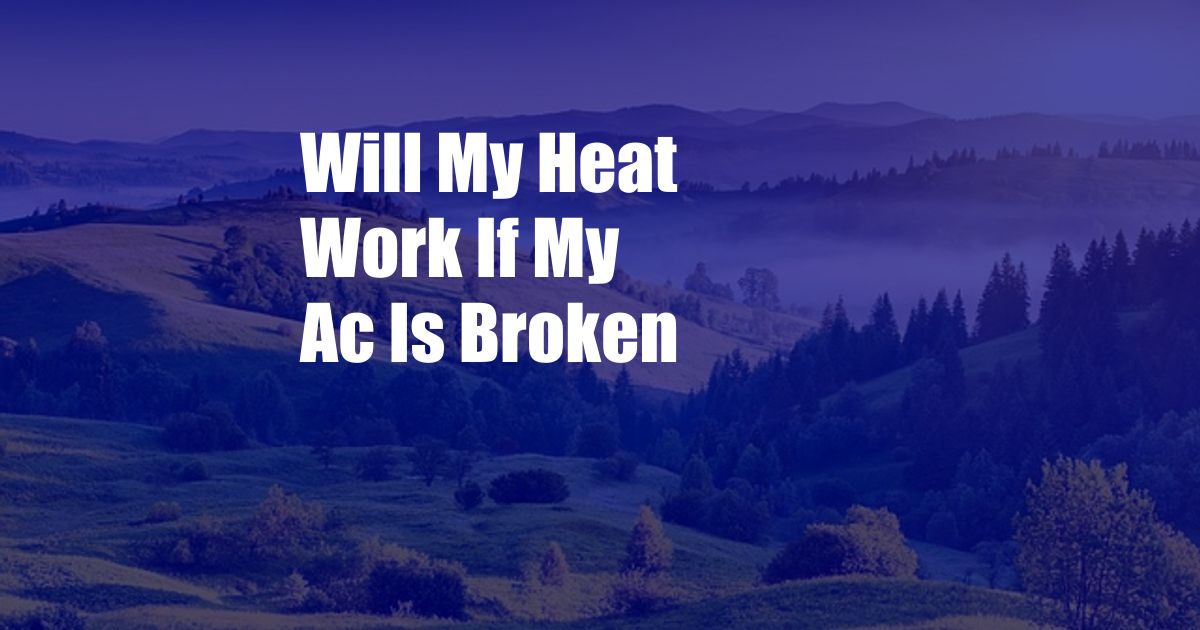
Will My Heat Work if My AC is Broken?
One evening, as the temperature dipped outside, I reached for the thermostat to turn up the heat, only to find that my home remained uncomfortably cold. It was then that I realized my air conditioner (AC) was broken. Panic set in as I imagined spending a frigid night in my own home. But then a question popped into my mind: “Will my heat work if my AC is broken?”
To my relief, the answer was yes. Most modern heating and cooling systems are designed to operate independently of each other. This means that even if your AC unit is malfunctioning, your heating system should still be able to provide warmth to your home.
Components of a Heating and Cooling System
To understand how your heating and cooling system works, it’s important to know its components:
**1. Furnace or Heat Pump:** This is the device responsible for generating heat in your home. It can be powered by fuel (gas, oil, propane), electricity, or geothermal energy.
**2. Air Handler:** The air handler circulates air through your home’s ducts. It contains a fan, heating and cooling coils, and a filter.
**3. Condenser Unit (AC Only):** This unit, located outdoors, releases heat from your home during the cooling process.
**4. Evaporator Coil (AC Only):** This coil, located inside your home, absorbs heat from the air.
Heating System Operation
When you turn on your heat, the furnace or heat pump ignites or activates to generate heat. The blower fan in the air handler then circulates the warm air through the ducts and into your home’s rooms.
During this process, the air handler’s heating coil becomes hot, transferring heat to the air passing through it. The cooled air is then returned to the furnace or heat pump, where it is reheated and recirculated.
AC vs. Heating: Independent Functions
The AC unit, on the other hand, has a separate function and does not interfere with the operation of your heating system. Its purpose is to cool your home by removing heat and humidity from the air. The evaporator coil absorbs heat from the air, transferring it to the refrigerant. The refrigerant then carries the heat to the condenser unit outdoors, where it is released.
Since the heating and cooling systems operate independently, a broken AC unit should not affect the functionality of your heating system.
Tips and Expert Advice
Here are a few tips and expert advice to keep in mind:
**1. Check the Circuit Breaker or Fuse:** Before calling for repairs, check if the circuit breaker for your AC or furnace has tripped or if a fuse has blown.
**2. Inspect the Thermostat:** Ensure that your thermostat is set to “Heat” mode and that the temperature is set above the current temperature in your home.
**3. Call a Qualified Technician:** If you have checked the circuit breaker, fuse, and thermostat and your heat still isn’t working, it’s recommended to call a qualified technician for diagnostics and repairs.
Frequently Asked Questions
Q: Can I use my fireplace instead of my furnace if my AC is broken?
A: While fireplaces can provide warmth, they are not recommended as a primary heating source and should be used with caution due to safety concerns.
Q: How can I improve the efficiency of my heating system?
A: Regular maintenance, filter replacement, and programmable thermostats can help enhance the efficiency of your heating system.
Q: What are the signs that my heating system needs repairs?
A: Unusual noises, uneven heating, and increased energy bills can indicate a need for repairs.
Conclusion
In summary, most modern heating and cooling systems operate independently, meaning that a broken AC unit should not affect the functionality of your heating system. However, if you experience any issues with your heat, it’s always recommended to consult with a qualified technician for proper diagnosis and repairs.
Are you interested in learning more about heating and cooling systems?